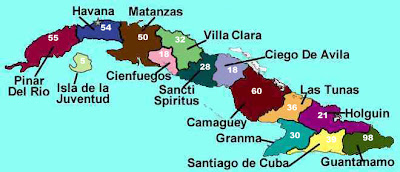 |
| Number of prisons per province in Cuba. In total, about 550. |
In his acceptance speech by video, Farinas, characteristically forthright, said: "In the minds of Cuba's current rulers, we Cuban citizens are just like the slaves from whom I am descended, kidnapped in Africa and brought to the Americas by force. For me or any other ordinary citizen to be able to travel abroad, I need a Carta de Libertad, that is a Freedom Card, just as the slaves did, only today it is called a Carta Blanca, a White Card."
His reference to the "white" card should also be a reminder of the long-imbedded racial discrimination against black Cubans by the Castro Revolution. In December 2009, I reported on the "Statement of Conscience by African-Americans" the month before by 60 prominent black Americans, including Cornel West, condemning the partnership of Jim Crow with the Cuban regime.
I have seen no further mention of that long-delayed protest from the actual signers of the declaration of conscience, and from hardly anyone else. Is this a self-imposed gag rule? I welcome any information about this strange silence, including from the Congressional Black Caucus.
Guillermo Farinas would have welcomed, I expect, some support from those prominent black Americans, and others of us. He thanked the European Parliament "for not abandoning the Cuban people in these more than 50 years of the struggle for democracy."
But he has been abandoned – despite his hunger strikes against the imprisonment of independent Cuban librarians, among other dissenters – by the American Library Association, which has yet to demand the release of these, among the other Castros' prisoners of conscience.
As Farinas delivered his acceptance speech, an empty chair draped in a Cuban flag was placed on the European Parliament stage.
Amnesty International has not abandoned him or any of the other Cubans treated like ungrateful slaves. Last summer, it called world attention to the harassment of Reina Luisa Tamayo, "who takes to the streets each Sunday with a small group of relatives to honor her son Orlando Zapta Tamayo who died Feb. 23 after refusing food and water for months."
Imprisoned since 2003 for "disrespecting authority," among other charges, Tamayo "became the first Cuban opposition leader in nearly 40 years to die after a hunger strike – an incident decried by U.S. Secretary of State Hillary Rodham Clinton and European leaders" (Associated Press, Aug. 17, 2010, and foxnews.com).
Reina Luisa Tamayo told Amnesty "that pro-government mobs surrounded her house in the eastern Cuban city of Banes on Sunday and prevented her, her family and friends from marching and attending Roman Catholic Mass. She said Cuban security forces kept other women who planned to march from leaving their homes."
Previously, a typical Castro regime warning was delivered to this besieged mother, as reported by Amnesty International: "On Aug. 8, a mob blocked (Tamayo's) path and beat relatives and friends who were marching – while police nearby failed to act. She said six loudspeakers has been installed near her house, used to shout insults against her and the Ladies in White, a Havana support group for wives and mother of political prisoners."
Has Secretary of State Clinton informed President Obama of the ruthless subjugation of liberty-starved Cubans that led to Guillermo Farinas receiving the Sakharov Prize? Does he care that in 2005 this human-rights prize was awarded to the Ladies in White in Cuba and – dig this – in 2002 to dissenter Oswaldo Paya?
A leader of the Christian Liberation Movement and several times nominated for a Nobel Peace Prize, Paya founded the still-continuing Varela Project aimed at establishing by referendum such scandalous heresies as freedom of press and religion and free elections. The only time I met the still-idolized-by-many Che Guevara (at the Cuban Mission to the United Nations), he professed to understand no English and was accompanied by a translator. As I asked him if he could conceive there ever being free elections in Cuba. Guevara, not waiting for the translator, broke into derisive laughter.
Last year, the Latin American Democratic Bridge Network awarded its first Prize for Democratic Openness to the doggedly surviving Varela Project (catholicnewsagency.com, May 20, 2010, reported again on CNA, Jan. 12, 2011). Because such freedom warriors as Oswaldo Paya do not give up, resistance is rising in Castroland.
The most accurate reports on Cuba come from Mary Anastasia O'Grady of the Wall Street Journal. On Dec. 27, she told those of us who care: "A new generation of angry, young Cubans now vents on blogs and through music, mocking the old man and his ruthless little brother. On Nov. 28, in the city of Santa Clara, hundreds of students launched a spontaneous protest when they were denied access to a televised soccer match they had paid to watch.
"What began as a demand for refunds soon turned to shouts of 'freedom,' 'down with Fidel' and 'down with socialism.'" These seeds may yet bring revolutionary liberty to Cubans. O'Grady provides more of the context:
Michael Moore notwithstanding, she writes that "Food, water, transportation, access to health care, electricity, soap and toilet paper are all hard to come by. ... The government tries to put the lid on through repression. But in private, among Cubans there are no limits to the derision of the brothers Castro."
On Nov. 28, 2007, Laura Bush held a video conference with members of the independent library movement with whom she expressed solidarity (Friends of Cuban Libraries). Your turn, Michelle Obama. President Obama has eased travel restrictions to – and the sending of money to Cubans – with restrictions, while calling for the return of freedom to Cubans. What will happen to any of these American travelers if they demand to see any prisoners of conscience?
Nat Hentoff
From: WorldNetDaily
Trapped in Castro's gulag and lived to tell about it – check out Armando Valladares' story of 20 years under dictator's thumb: "Against All Hope"

No comments:
Post a Comment